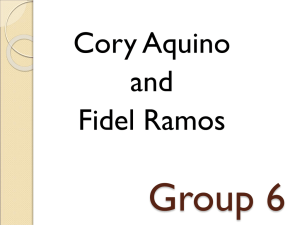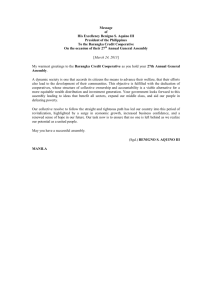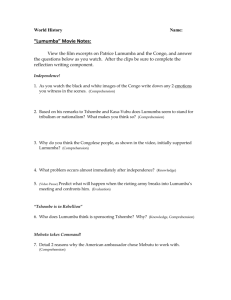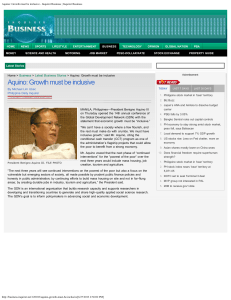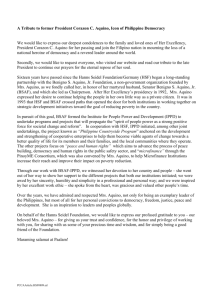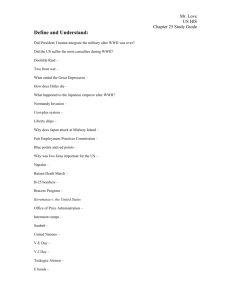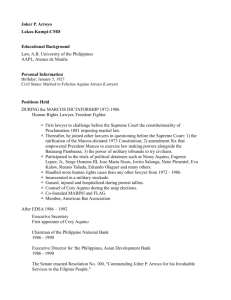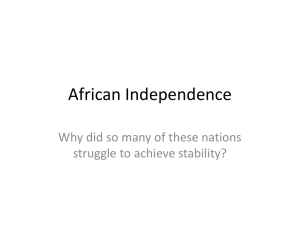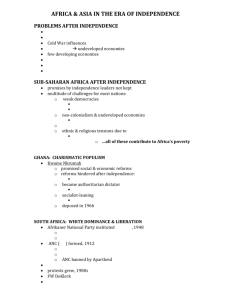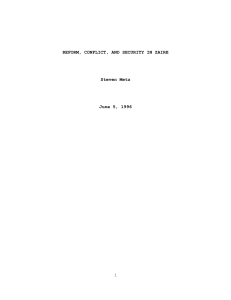Chapter 18.2: Southeast Asian Nations Gain Independence US and
advertisement
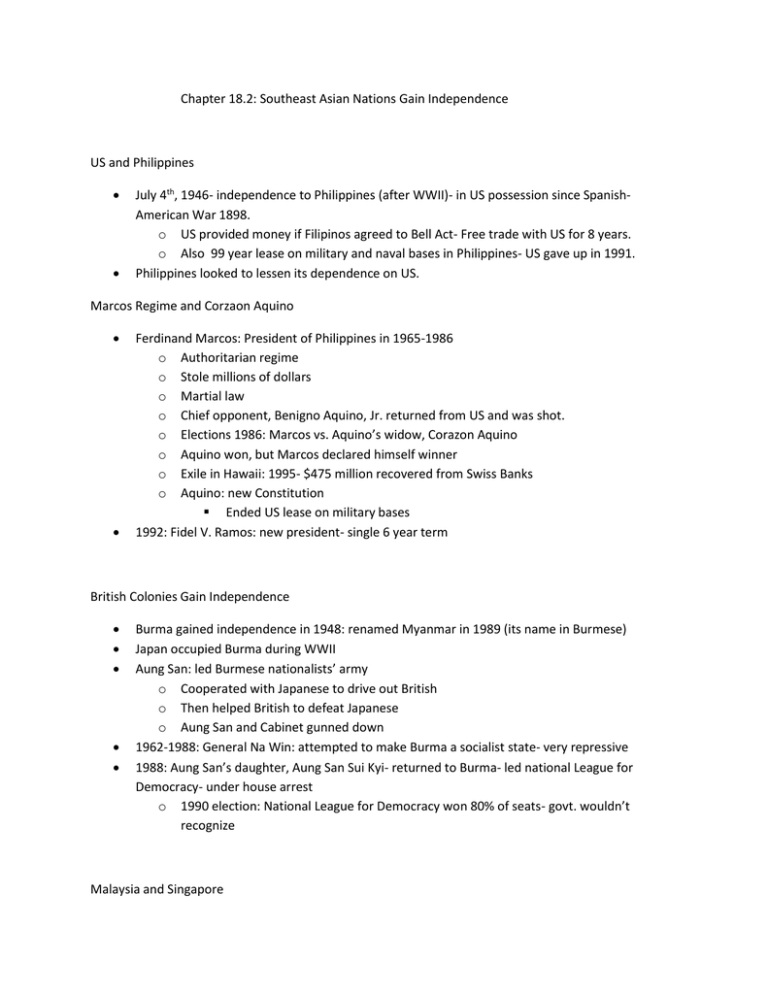
Chapter 18.2: Southeast Asian Nations Gain Independence US and Philippines July 4th, 1946- independence to Philippines (after WWII)- in US possession since SpanishAmerican War 1898. o US provided money if Filipinos agreed to Bell Act- Free trade with US for 8 years. o Also 99 year lease on military and naval bases in Philippines- US gave up in 1991. Philippines looked to lessen its dependence on US. Marcos Regime and Corzaon Aquino Ferdinand Marcos: President of Philippines in 1965-1986 o Authoritarian regime o Stole millions of dollars o Martial law o Chief opponent, Benigno Aquino, Jr. returned from US and was shot. o Elections 1986: Marcos vs. Aquino’s widow, Corazon Aquino o Aquino won, but Marcos declared himself winner o Exile in Hawaii: 1995- $475 million recovered from Swiss Banks o Aquino: new Constitution Ended US lease on military bases 1992: Fidel V. Ramos: new president- single 6 year term British Colonies Gain Independence Burma gained independence in 1948: renamed Myanmar in 1989 (its name in Burmese) Japan occupied Burma during WWII Aung San: led Burmese nationalists’ army o Cooperated with Japanese to drive out British o Then helped British to defeat Japanese o Aung San and Cabinet gunned down 1962-1988: General Na Win: attempted to make Burma a socialist state- very repressive 1988: Aung San’s daughter, Aung San Sui Kyi- returned to Burma- led national League for Democracy- under house arrest o 1990 election: National League for Democracy won 80% of seats- govt. wouldn’t recognize Malaysia and Singapore Occupied by Japan during WWII Post-WWII: Britain tried to take control back 1957: Federation of Malaya created: Singapore, Malaya, Sarawak, and Sabah 1965: Singapore became independent city-state Singapore ruled by Lee Kuan Yew 1959-1990: key banking and trading center. Indonesian Gains Independence from the Dutch Japan occupied Indonesia during WWII After Japanese surrender, Sakarno declared Indonesia’s independence and himself President Dutch tried to regain control Dutch had created an underclass during their rule by preventing Indonesians from obtaining higher education/ wanted as servants- turned over 1949 Sukarno as “President for Life” Bloody coup in 1965: Suppressed by Suharto, then he took power- police state, upwards of one million killed 1998 Suharto forced to resign 1999 Indonesia elected Abdurrahman Walid Chapter 18.3: New Nations in Africa Background to Independence Negritude Movement: celebrate African culture, heritage, and values Leader Leopold Senghor= 1st President of Senegal African soldiers fought with Europeans during WWII to “defend freedom” Ghana British colony of Gold Coast- renamed Ghana in 1957 Led by Kwame Nekrumah: former teacher o Organized strikes and boycotts against British Kwame Nekrumah: first prime minister of Ghana, and then “President for Life” o Studied Socialism/ Marxism/ Marcus Garvey o Large economic projects/ industrialization and education o Value of primary cash crop, cacao plummeted- funds for programs dried up o Wanted a “United States of Africa” Pan-African congress Organization of African Unity (OAU 1963) o 1966: Nkrumah in China: military seized power o “We prefer self-government with danger to servitude in tranquility.” Kenya and the Mau Mau Rebellion British settlers occupied prize farmland in highlands of Kenya- resisted independence for Kenya Jomo Kenyatta: strong Kenyan nationalist leader Mau-Mau: secret society of many Kikuyu Farmers British granted Kenya independence: 1963 o 10,000 black Kenyans and 100 White Kenyans killed Kenyatta: 1st President- unify country, strengthen capital of Nairobi Successor: Daniel arap Moi- not as popular o Ethnic conflicts in early 1990’s The Congo Belgians plundered Congo’s resources of rubber and copper with forced labor Independence Brings Change Granted independence 1960 to Congo (named Zaire 1965-1997) Patrice Lumumba= Nation’s first Prime Minister Southeast Province: Moise Tshombe declared independence o Copper in Katanga’s mines= main export Tshombe backed by Belgian mining interests Lumumba: had communist connections, asked UN for help, then USSR Coup led by army officer Mobutu Sese Seko- overthrew Lumumba and turned him over to enemy, Tshombe 1965: Mobutu then overthrew Tshombe Mobutu: ruled Zaire 32 years, country was rich in resources, but population very poor 1997: Mobutu was overthrown by Laurent Kabila who banned political parties, promised free elections by 1999, and then reneged Algeria 1945: One million French colonists, 9 million Arab and Berber Muslims in Algeria France offered full rights (assimilation) to Algerians to try and maintain its power. 1945: French troops fired on Algerian nationalist demonstrators 1954: Algerian National Liberation Front (FLN)- used guerilla tactics at home, and diplomatic tactics internationally French sent over ½ million troops to Algeria to try and fight FLN- both sides committed atrocities De Gaulle: Returned to power 1958 o Cease-fire March 1962- July 1962: independence o 750,000 French settlers fled Algeria Ahmed Ben Bella: leader of FLN: 1st Prime Minister and First President 1965 o Land reforms/ education o Overthrown by Chief of Staff 1965-1988: modernize and industrialize, but oil prices plunged Conflict between Muslim fundamentalists and more secular leadership Ongoing Civil War Angola Gains Independence Portuguese 1st European in Africa, last to leave Angola had no education or health facilities and littler commerce when gained its independence Rebels in Angola: Portugal sent 50,000 troops to put down- Portuguese dictatorship toppled by military Portuguese withdrew from Angola 1975 without handing over power. Communist seizure of power (MPLA) seized capital Civil War among various rebel groups MBLA helped by Cuba and USSR/ FNLA backed by Zaire and US/ UNITA backed by South Africa and US Attempt at peace negotiations in 1989- Civil War continued into 2000’s
